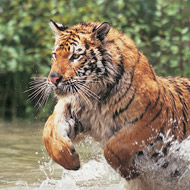
Calls to raise issue with Chinese President during State visit
Charities worldwide are calling on Prime Minister David Cameron to raise the serious issue of tiger trade with Chinese President Xi Jinping during his state visit to the UK this week.
In a joint letter to David Cameron, 18 charities, including the Born Free Foundation, urge the UK to impress upon China the vital need to take immediate action to protect the remaining 3,200 wild tigers that live in Asia.
The letter warns: “One of the most significant threats to the survival of tigers is trade in their body parts. The trade threat is exacerbated by a marked increase in tiger ‘farms’ in China, Laos, Vietnam and Thailand where more than double the number of wild tigers are kept and are often intensively bred for trade in skins, bones, meat and other body parts.”
Plagued by habitat loss and degradation, wild tigers also face increasing conflict with humans due to expanding populations and the increasing availability of commercially produced tiger products.
China is the main producer of captive bred tigers, their parts, and their products, as well as their main consumer. However, counter to its commitments under the Convention on International Trade in Endangered Species, China’s government has supported the expansion of tiger farms, and allowed a legal trade in skins from farmed tigers and approved tiger farm wineries that make tiger-bone wine
Adam M. Roberts, Born Free’s CEO explains: “The continued fostering of a captive industry to supply a market for derived products only puts more strain on the ability of wild tigers to survive the 21st century.
"This very market often perceives the wild counterpart as more powerful, virile or otherwise more desirable, so that wild tigers throughout their range continue to feel the heat and suffer sustained and potentially irreversible poaching.”
The letter calls on David Cameron to encourage Xi Jinping to announce a total ban on all trade in tiger parts and derivatives including from captive tigers, to end tiger farming, and to destroy stockpiles of tiger parts and derivatives.



 The BSAVA has opened submissions for the BSAVA Clinical Research Abstracts 2026.
The BSAVA has opened submissions for the BSAVA Clinical Research Abstracts 2026.